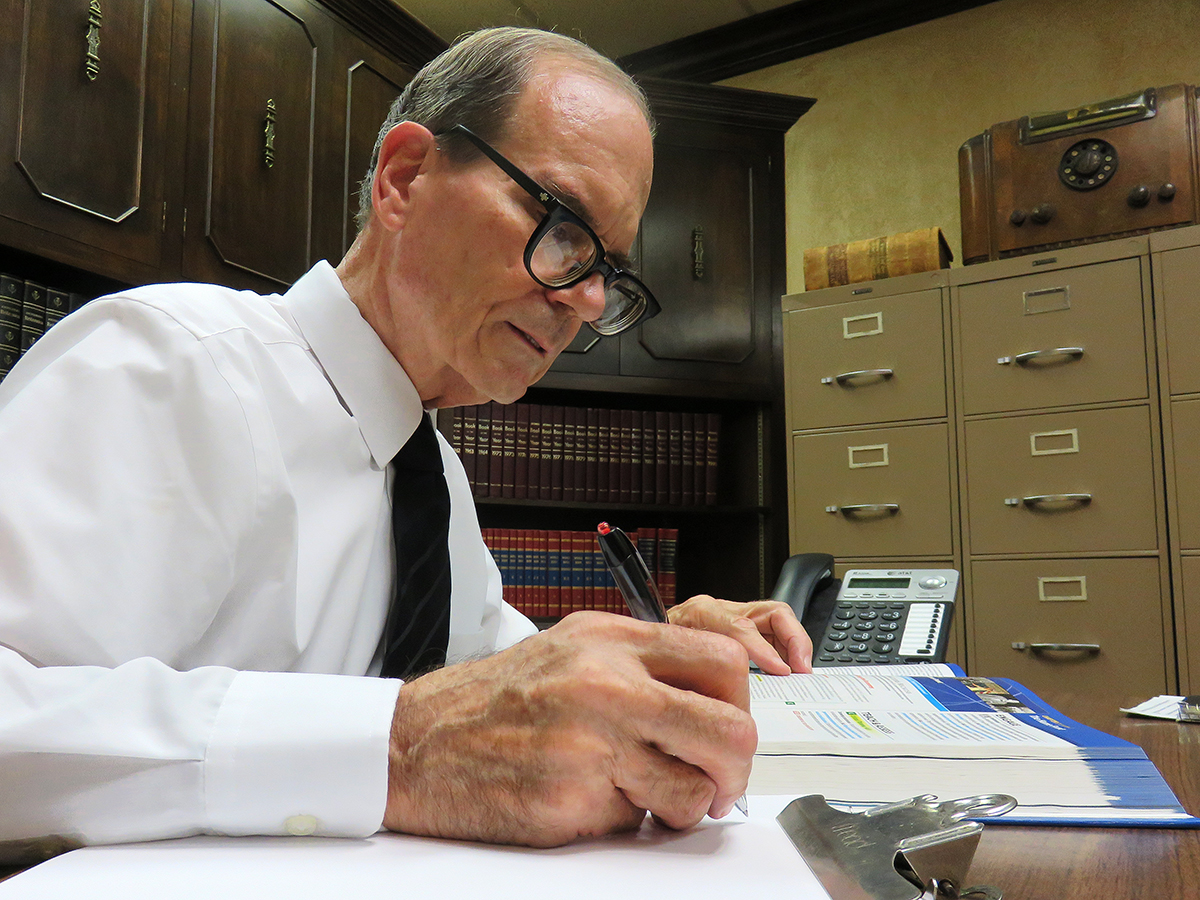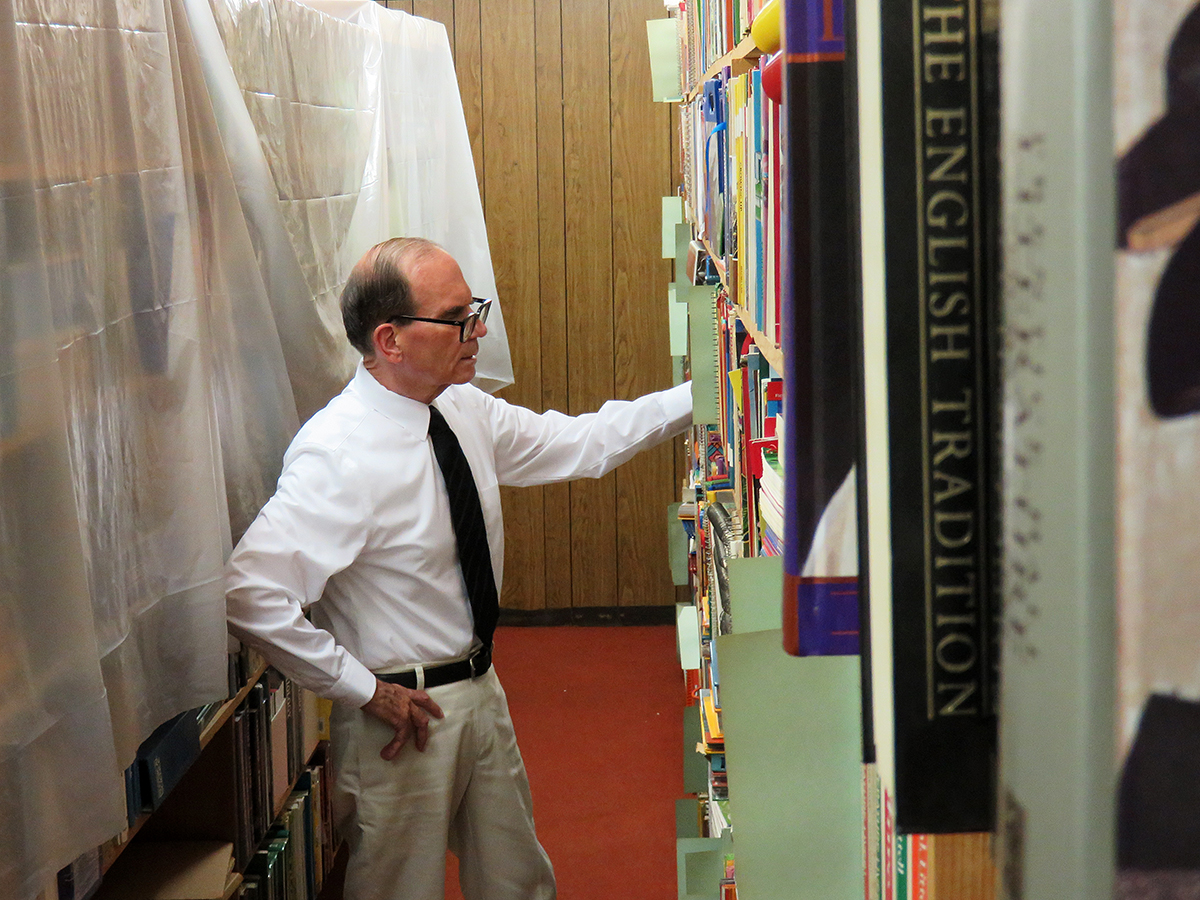Textbook Warrior Fights ‘Satanic Thought’
By John Savage
Photography By John Savage
Reporting Texas

Since 1982, Neal Frey has crusaded to rid Texas textbooks of “Satanic logic,” and “liberal bias.” He works from a barebones office in Longview. John Savage/Reporting Texas.
LONGVIEW — “Satanic thought” and “liberal bias” have infiltrated Texas public school textbooks, Neal Frey says, and the 72-year-old is on a crusade to stop them.
Academic authority might object to Frey’s mission. But he’s undeterred.
“God put us here to win the culture war,” Frey said, as sweat beaded on his forehead during a September interview in his un-air-conditioned office.
Frey runs Educational Research Analysts out of his office in a rundown, 1960s-era strip mall. The organization distributes conservative Christian talking points on issues such as evolution and same-sex marriage to like-minded State Board of Education members and works to privately pressure publishers before they submit books to the state board for consideration.
While many of his victories are small, he said they add up to something substantial: textbook content better aligned with a conservative Christian worldview. That means books must stress America’s exceptionalism and its Christian foundations, and include alternative viewpoints on issues such as evolution, which the Educational Research Analysts’ website calls a “natural origins myth.”
East Texans Mel and Norma Gabler founded the nonprofit in 1961. They gained a measure of national fame by railing against perceived un-American and anti-Christian bias in schoolbooks at State Board of Education meetings and on television programs such as “60 Minutes” and “20/20.”
As their fame and influence with textbook decision-makers grew, publishers were compelled to confer with the Gablers, sometimes sending them textbook manuscripts for review. Frey, who took over the organization when Mel Gabler died in 2004, has embraced the less public approach of discretely working directly with publishers.
David Anderson, a former vice president at textbook publisher Holt, Rinehart & Winston and a Texas Education Agency official from 1997 to 2003, said Frey, like the Gablers, has influence with publishers. “When I was with the Texas Education Agency, I did see publishers make changes as a result of information from Frey,” Anderson said.
Frey’s sparsely decorated office seems stuck in a time warp. Vintage encyclopedias line a shelf behind his desk. A 1937 Emerson radio, given to him by his mother almost 60 years ago, sits atop a beige file cabinet. The workspace is devoid of seemingly essential technological trappings — no iPad, no computer, not even a typewriter. Frey works the old-school way. He puts pencil to paper.
He drives an immaculately maintained lemon-yellow 1966 Plymouth Valiant (he likes that the government doesn’t regulate the car’s emissions because of its age) that his mother gave him. The odometer reads 403,000 miles. Frey does not have a credit card, television or air-conditioning. His diet is ascetic: after fasting for three days he eats 60 prunes, and then, after two days of normal dining, he starts the cycle again.
Most days, he arrives at the office at 11 a.m. and recites two Bible verses; one of them, James 1:5-7, reads: “You must believe and not doubt, because the one who doubts is like a wave of the sea, blown and tossed by the wind.”

Frey tries to persuade publishers to include conservative Christian viewpoints in their books. Photo by John Savage/Reporting Texas.
On an average day, he’ll parse 30 to 40 pages, comparing proposed textbook content to review criteria based on his fundamentalist Baptist worldview. The review criteria, available on the Educational Research Analysts website, includes assertions such as “Only the Christian West realized slavery was wrong and took the lead in abolishing it” and suggestions such as “Avoid asexual stealth phrases and definitions that covertly legitimize homosexuality.”
Frey interacts with few humans besides his wife of almost 50 years, Judy, and their son, Noah, who assist him. A self-avowed loner and perfectionist, Frey believes God blessed him with the temperament to be an effective textbook watchdog. “If you’re not a perfectionist, you’re worthless to this work,” he said.
Frey compiles his findings in newsletters that he mails to board members and 2,000 other supporters once or twice a year. Full of jargon, the newsletters are far from riveting, Frey admitted, but donors like them. Most of his organization’s funding, about $60,000 a year, comes from small donations, according to the nonprofit’s federal tax return.
Conservative Christian education board member Barbara Cargill, in an email to Reporting Texas, wrote that she talks to Frey infrequently but follows his work through the newsletters. “He’s successful, and that is because he is meticulous in his work and backs up everything with accurate information and research,” Cargill wrote.
Frey grew up in a Maryland suburb of Washington, D.C., and was “saved” at 9 years old, he said. Today, his thick glasses, thin gray hair and quiet manner of speaking give him a professorial air, but Frey disdains what he calls the secular leftist elites who populate the ivory towers of academia.
This is why, in part, he chose to attend Houghton College, a Christian college in western New York state. At Houghton, Frey met his wife. After graduation in 1966, the couple moved to Charlottesville, Va., where he studied for a doctorate in American intellectual history at the University of Virginia but did not finish his dissertation.
After graduate school, Frey taught history at Houghton and at what is today San Diego Christian College. Then, in 1982, he got a call from Mel Gabler asking him to join Educational Research Analysts. It was divine intervention, Frey said.
Frey labels his foes “the miseducation establishment” — the confluence of schools of education, teachers’ unions and left-leaning interest groups that, he says, control public education. Asked about some of his victories, Frey pointed to a publisher’s decision in 2004 to add language that defined marriage strictly as between one man and one woman to a health textbook. Frey didn’t get all the changes he wanted, though. “The textbooks used asexual stealth phrases — partners, couples, spouses — instead of man and woman,” Frey said, “and we didn’t get the publishers to change that.”
In 2010, Frey worked to get the board to pass a resolution denouncing “pro-Islamic/anti-Christian bias” in textbooks. According to the resolution, Texas social studies books approved for use from 1999-2003 gave Christian beliefs and practices short shrift compared to Islamic ones. Frey said he “ghost wrote 99 percent” of the resolution.
Gail Lowe, who chaired the board from 2009-2011, said Frey “did have significant input.”
The non-binding resolution had little practical effect beyond religious fear-mongering, said Dan Quinn, spokesperson of the Texas Freedom Network, a left-leaning educational policy group.
In theory, Texas’ textbook adoption process is open to public scrutiny. The state issues a call for new books, publishers submit sample books and state Educational Service Centers make them available for public review. State-appointed experts also review the books. After a public comment period and public hearings, the board issues a list of approved textbooks. By contacting publishers and board members directly, Frey works outside of this framework.
Working with board members can be effective, Frey said, but pressuring publishers before books are submitted is often more productive. “If you have their trust and confidence, sometimes publisher’s sales reps and editors will be surprisingly open to you.”
Because Texas is one of the nation’s largest textbook purchasers, and publishers traditionally have preferred not to publish different books in different parts of the country for economic reasons, the 15-member Board of education — the elected body tasked with approving books — has clout in what publishers include in books across the nation. This clout has diminished some because technological advances allow publishers to more easily customize instructional materials.
Frey and the conservative Christian bloc of the board have less power today than they did a few years ago. Two members of the block lost re-election bids, shrinking the group from seven to five members. The Legislature also passed a law in 2011 allowing local school districts to purchase books not on the state-approved list, though few choose to do so.
Despite the board’s shift, such as it is, from hard-right ideology, Frey insists that he is not an anachronism. Board of Education observers agree.
Quinn said the election of two or three more conservative Christians to the board could swing the culture war pendulum, and the direction of Texas textbooks, back in Frey’s favor.
In the meantime, Frey will fight on, confident in his eventual victory.
“Every system of Satanic thought has a flaw somewhere, and if you identify that flaw and tug at it, the whole tapestry collapses,” he said.